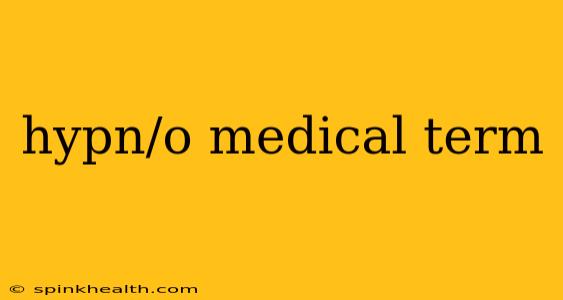The medical term "hypn/o" might seem cryptic at first glance, but it holds a fascinating story within its syllables. This prefix, derived from the Greek word "hypnos" meaning "sleep," serves as a key to understanding a range of conditions and procedures related to sleep and, surprisingly, suggestion. It's not just about slumber; hypn/o encompasses the powerful influence of the subconscious mind. Let's delve into the world of this intriguing medical term.
What Does Hypn/o Mean in Medical Terminology?
At its core, hypn/o refers to sleep. But its applications extend beyond simply describing the state of being asleep. In medical contexts, it signifies a connection to sleep-related processes, conditions, or interventions. This includes not just the physiology of sleep itself but also its influence on psychological and physiological states. Think of it as a window into the subconscious – a realm where suggestions can take root and exert influence.
What are Some Medical Terms That Start with Hypn/o?
Many medical terms incorporate "hypn/o" to clarify their relationship to sleep or states of altered consciousness. Some common examples include:
-
Hypnosis: This is perhaps the most well-known term incorporating "hypn/o." It refers to a state of heightened suggestibility, often induced by a therapist or hypnotist, where the individual experiences a focused state of attention and relaxation. During hypnosis, the subconscious mind becomes more open to suggestions aimed at addressing various issues.
-
Hypnotic: This adjective describes something that induces hypnosis or is characteristic of the hypnotic state. For example, a "hypnotic suggestion" is a statement or instruction given during hypnosis, intended to produce a specific effect.
-
Hypnotherapy: This is a therapeutic approach utilizing hypnosis to address psychological or physical conditions. Hypnotherapy might be used to manage pain, anxiety, phobias, or even support habit modification.
-
Hypnopedia: This term, though less frequently used in modern medical parlance, refers to the idea of learning while asleep. While the effectiveness of hypnopedia is debated, the concept underlines the subconscious influence during sleep.
How is Hypn/o Used in Medical Practice?
The application of "hypn/o"-related terminology and techniques is surprisingly diverse within the medical field.
-
Pain Management: Hypnotherapy is sometimes used as a complementary therapy for pain management, helping individuals cope with chronic pain conditions.
-
Mental Health: Hypnosis is employed in some forms of psychotherapy to help individuals access and process repressed emotions or traumatic memories.
-
Habit Modification: Hypnosis can be a useful tool in assisting people to overcome unwanted habits such as smoking or overeating.
-
Surgery: In some cases, hypnosis might be used in conjunction with anesthesia, helping patients to relax and reducing anxiety before and after surgical procedures. (Note: This is a less common practice, and anesthesia is always primary).
What are the Limitations of Hypn/o-Related Therapies?
While hypn/o-related therapies can be beneficial for some individuals, it's essential to remember that they are not a panacea. Their effectiveness varies depending on individual factors, the specific condition being treated, and the skill of the practitioner. It’s crucial to seek out qualified and reputable healthcare professionals experienced in these methods. Hypnosis should be considered a complementary therapy, and not a replacement for evidence-based medical treatment for serious conditions.
Is Hypn/o Related to Sleep Disorders?
While "hypn/o" itself doesn't directly define a sleep disorder, it relates to the study and treatment of them. Many sleep disorders involve disruptions in the natural sleep-wake cycle, and understanding the intricacies of sleep is crucial for diagnosing and managing such conditions. This knowledge underpins the development of interventions and therapies aimed at improving sleep quality and addressing sleep disturbances.
What are the Differences Between Hypnosis and Sleep?
This is a common point of confusion. While hypnosis involves relaxation and a focused state of mind, it's not the same as sleep. Individuals under hypnosis are usually aware of their surroundings and can respond to instructions, unlike someone in deep sleep. The key difference lies in the level of suggestibility and conscious awareness.
In conclusion, the seemingly simple medical term "hypn/o" opens a door to a fascinating world encompassing sleep, the subconscious, and the therapeutic potential of suggestion. Its applications are diverse and continue to evolve within the medical field, offering a complementary approach to addressing various physical and mental health challenges. Always consult with qualified healthcare professionals to determine the appropriateness of hypn/o-related therapies for individual needs.

